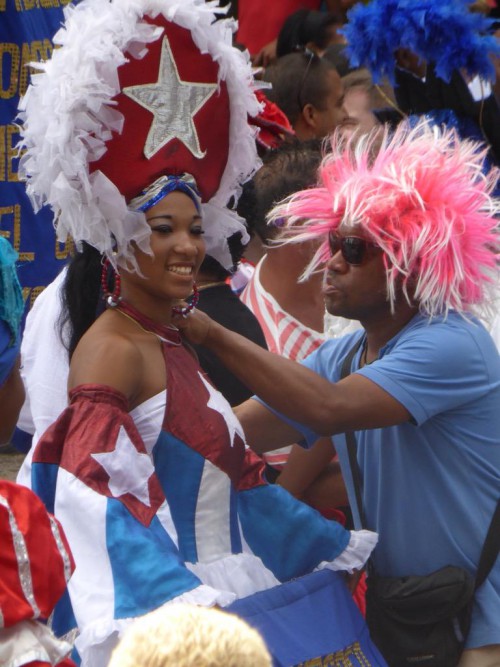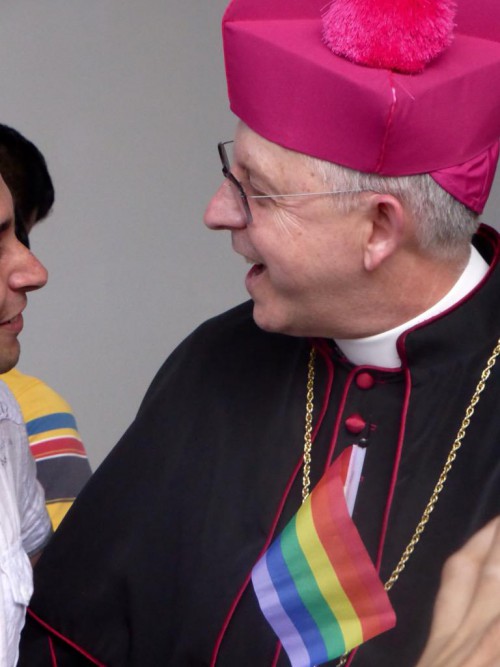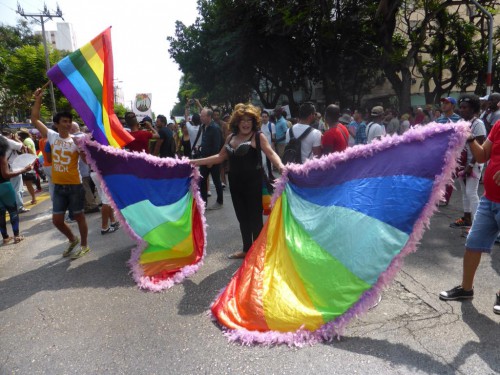17th May 2015 Havana, Cuba
Homophobia and transphobia – a battle we share
The Conga Cubana against Homophobia and Transphobia held in Havana on 9 May was a riot of colour and noise. With whistles, banners, flags and hand-written signs, about 1500 people marched up 23rd Street calling for their rights to be respected. I was honoured to be invited and to attend and was impressed by what I saw and heard. The march was a powerful statement of identity and diversity and an appeal for Cubans to respect everyone in society whatever their sexual orientation or gender identity. In her speech afterwards, Mariela Castro, the Head of CENESEX, the Cuban organisation that leads the fight for LGBT rights, called for ‘the human rights of all Cubans’ to be respected. ‘Socialism, yes! Transphobia, no!’ chanted some in the crowd as they marched.
The death of Yosvani Muñoz Robaina, a transsexual who was allegedly killed in April in Pinar del Rio because of her gender orientation, underlines the level of prejudice that continues to exist in Cuba. As in many other countries, Cuban gays, lesbians, bisexuals and transsexuals face prejudice every day and find themselves having to lie to their friends, families, communities and in their workplaces about their sexuality or gender orientation. Organisations like CENESEX and the Arco Iris Project are working to raise awareness about these issues and ensure the rights of LGBT people are respected in practice as well as in law.

The battle for LGBT rights in the United Kingdom has been long but in the last decades there have been some real steps forward. In 2000, the ban on LGBT soldiers serving openly in the Armed Forces was lifted and since 2005, transgender people have had the right to change their legal gender. Today, LGBT citizens have most of the same legal rights as non-LGBT citizens and the UK provides one of the highest degrees of liberty in the world for its LGBT communities.The recent parliamentary elections on 7 May represent something of a breakthrough as 32 of the 650 MPs elected are gay, lesbian or bisexual. That, apparently, makes the British parliament the most sexually diverse in the world although there are still no British transgender MPs. In contrast, Adela Hernandez, a Cuban transsexual, was elected to represent the municipal council in Caibarien in Villa Clara Province in 2012.
 Another step forward is that same sex marriages are now legal in England, Wales and Scotland (but not Northern Ireland). The first took place in March 2014. Then the Prime Minister David Cameron wrote, ‘Any marriage takes work, requires patience and understanding, give and take – but what it gives back in terms of love, support, stability and happiness is immeasurable. That is not something that the State should ever deny someone on the basis of their sexuality. When people’s love is divided by law, it is the law that needs to change.’ Currently 17 countries world-wide recognize same sex marriage including Argentina, Brazil and Uruguay in Latin America. One day, I am sure, there will be many more.
Another step forward is that same sex marriages are now legal in England, Wales and Scotland (but not Northern Ireland). The first took place in March 2014. Then the Prime Minister David Cameron wrote, ‘Any marriage takes work, requires patience and understanding, give and take – but what it gives back in terms of love, support, stability and happiness is immeasurable. That is not something that the State should ever deny someone on the basis of their sexuality. When people’s love is divided by law, it is the law that needs to change.’ Currently 17 countries world-wide recognize same sex marriage including Argentina, Brazil and Uruguay in Latin America. One day, I am sure, there will be many more.

Excellent post Tim. Cuba and the UK are amongst the leading countries on equalities these days.